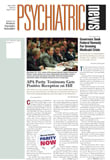In June Vermont enacted legislation designed to contain the costs of prescription drugs and increase access to those drugs through use of a preferred drug list and other means. It applies to the Medicaid program and various other state programs for low-income people and other groups.
A key element of the bill (Act Relating to Prescription Drug Cost Containment and Affordable Access, H 31) stipulates that the “prior authorization process shall not apply to prescription drugs prescribed for the treatment of severe and persistent mental illness including schizophrenia, severe depression, or bipolar disorder.”
Combined Efforts
David Fassler, M.D., the representative for state and federal legislation of the Vermont Psychiatric Association (VPA) and an APA trustee, told Psychiatric News that the exemption and other safeguards in the legislation came about because of the combined efforts of VPA, the Vermont Medical Society, and other advocacy groups such as the Alliance for the Mentally Ill of Vermont.
“Acting on our own, this level of success would have been almost impossible,” he said.
The associations also were able to defeat a provision that would have allowed pharmacists discretion to substitute drugs for those prescribed.
Fassler said the groups are working to ensure that the exemption covers all prescription drugs necessary to treat mental illness.
Cheryl Rivers, executive director of the Northeast Legislative Association on Prescription Drug Prices, told Psychiatric News, “The Vermont legislature was able to support that exemption because we know it’s tough to get medications right with mental illness. We understand, for example, that the change in the color of a pill can affect a patient.”
Rivers, who is a former chair of the Senate Finance Committee in Vermont, did not rule out the possibility that the exemption might be eliminated in the future.
Other Safeguards
The law contains other important safeguards. For example, in cases where prior authorization is required, prescribers for a patient with an emergency condition must receive a response within four hours from the time the program or participating health plan receives the request.
In addition, the legislation stipulates several activities to help the state evaluate the effectiveness of the law.
A state official must submit a report to appropriate legislative committees each year, including an assessment of administrative costs relating to prescription drug benefits, costs and savings of the pharmacy benefit manager (PBM) contract, and recommendations for improving the effectiveness of the contract.
The state will not enter into a contract with a PBM unless the PBM agrees to disclose any agreement to favor the products of one manufacturer over a competitor and any agreement by which the manufacturer provides the PBM with rebates or other economic benefits.
The PBM must also disclose any agreement to sell prescription drug data on Vermont beneficiaries or data concerning prescribing practices.
The first successful state attempt to institute a formulary took place in May 2001, when the Florida legislature established a preferred drug list that consisted of drugs for which manufacturers grant supplemental rebates of 10 percent. Drugs used to treat mental illness and HIV are exempt from the legislation (Psychiatric News, March 1).
Since then, Michigan has established a formulary that requires authorization from a “state technician” if a drug is not on the list. Drugs used to treat mental illness are not exempt (Psychiatric News, January 18, April 19, August 2).
Indiana, Minnesota, Kansas, and Ohio have passed legislation related to Medicaid drug formularies providing full or partial protections for drugs used to treat mental illness.
In a related action, the U.S. Senate voted on July 18 to approve a measure that would allow states to use the purchasing power of their Medicaid programs to negotiate prescription drug discounts for residents who would not otherwise qualify for Medicaid.
The measure is an amendment to the Greater Access to Affordable Pharmaceuticals Act of 2001 (S 812), a bill that addresses several prescription drug issues, including a Medicare drug benefit.
According to the July 19 Wall Street Journal, the measure would allow states to negotiate larger discounts than the Medicaid law requires and add prescription drug formularies to their Medicaid programs.
The Pharmaceutical Research and Manufacturers of America (PhRMA) has filed suit to stop similar prescription drug-discount programs enacted in various states. PhRMA President Alan Holmer is quoted in the July 19 Wall Street Journal as saying that the measure would “put state bureaucrats, not doctors, in charge of medical decisions for Medicaid patients and would force Medicaid patients to the back of the line when it comes to state-of-the-art medicine.”
